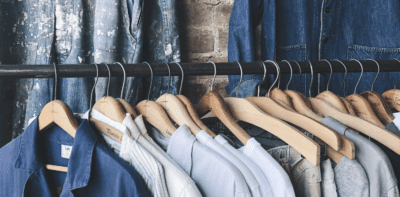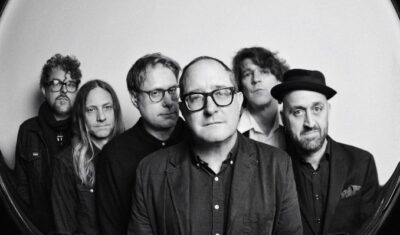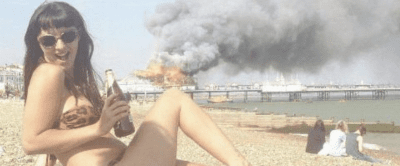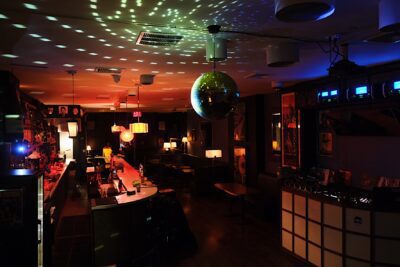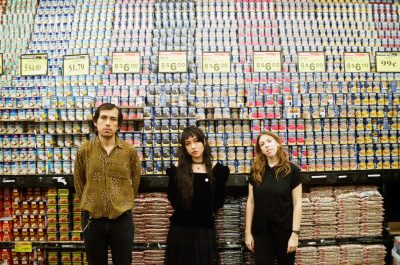Inside Brooklyn’s burgeoning queer-inclusive barbershop community
Pandemic slowdown aside, Brooklyn barbers have been working to provide a safe space for clients for whom hair is a crucial signifier
Army veteran Tucker LaDore never dared getting a short haircut at the base where they were stationed in Texas, even though that’s what LaDore would have preferred. Although shorter cuts are common in the military, LaDore worried that, as an LGBTQ-identifying person in the era of “Don’t Ask, Don’t Tell,” a traditionally masculine style could put them in danger.
“My hair was the longest it’s ever been in my life because of the on-post barber shop culture that I didn’t want anything to do with,” LaDore says.
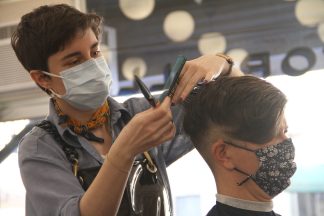
Strosberg trims a client’s hair (Photo: Nyk Kiki Laurence)
But when the 39-year-old moved to New York, they met a barber named Vivian Strosberg who made them feel comfortable asking for a shorter style. When Strosberg eventually opened up a LGBTQ-inclusive shop of her own in Park Slope, she asked if LaDore would be a receptionist on busy days.
“And I said, ‘No, but I’ll be the receptionista,”’ LaDore recalls, petting a tiny chihuahua mix named Marty. This, of course, was shortly before the pandemic shut down haircutting establishments across the city, including those that double as community spaces for LGBTQ+ folks.
Barbershops are of course neighborhood hubs where friends gather to gossip, talk politics and catch up. But they haven’t always been friendly to LGBTQ-identifying people—or anyone who doesn’t fit into a narrow definition of masculinity. And although it has become more socially-acceptable for men to frequent salons, they have been historically marketed as woman-centric spaces, according to sociologist Kristen Barber whose book, “Styling Masculinity,” explores the topic. This leaves little room for women, non-binary people and others who prefer shorter or otherwise non-gender-conforming cuts.
It also drives LGBTQ+ folks to cut their hair behind closed doors: That’s the case with Strosberg, who would either cut her own hair or recruited the help of friends until she began cutting hair professionally.
A cut above
Cowlick is one of a growing number of queer-inclusive barbershops that have emerged in Brooklyn over the past several years that explicitly cater to the LGBTQ+ community. They set themselves apart by adopting gender-neutral pricing models and openly advocating against harassment and discrimination in the industry.
More than 90 percent of LGBTQ+ customers have been misgendered during a hair appointment and nearly 60 percent have felt judgment while getting a haircut, according to the Dress Code Project, an organization that provides resources and training to around 400 inclusive barbershops across the globe.
But that’s changing. There are now more inclusive barbershops across the borough than ever before, according to the Dress Code Project’s founder, Kristin Rankin, who notes a particular spike in interest from Brooklyn barbers looking to adopt LGBTQ-friendly practices over the past several years.
When these more inclusive barbershops closed at the outset of the pandemic, some LGBTQ+ customers were hit particularly hard.
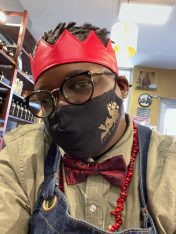

Camera Ready: Kutzwell
“I have clients that are in the middle of transitioning or at the beginning of transitioning or even just thinking about transitioning. And to them in particular, their hair is almost everything,” says Khane Kutzwell, owner of Camera Ready Kutz in Crown Heights. “In that instance, it is way different than your average, everyday barbershop closing. Because we’re not only responsible for just making people look good, but we’re responsible for their self-esteem and transitions in life.”
Kutzwell was one of the first owners to openly advertise LGBTQ-friendly services in 2007. It’s important, Kutzwell says, that her clients represent the diversity of the neighborhood. She trains barbers in multiple hair textures so that people from any background will feel comfortable entering the shop.
A hairstyle can offer an opportunity to showcase one’s fashion sensibilities and personality, but for many, it’s more than that: it’s an important identity marker.
“An affirming haircut could be something that helps a trans person pass as their gender in society, and we have little tools that signal, in a really subconscious way, that this person is masculine or this person is feminine,” says Strosberg, Cowlick’s owner.
Strosberg often hears from feminine-presenting people who say they’ve experienced verbal harassment or have had barbers refuse to cut their hair in the way they’d requested. With these traumatic experiences in mind, Strosberg and her colleague, Leah Jubara, foster friendly, sensitive conversations.
“Leah and I will be cutting two clients side-by-side, and all four of us will be sharing our experiences with the first time we shaved our head or when we came out to our parents,” Strosberg says.
In the midst of the pandemic, Cowlick is encouraging its regulars to purchase gift cards that can be put toward a special fund to provide haircuts to people who cannot otherwise afford them.
Meanwhile, Camera Ready Kutz launched a successful GoFundMe campaign to support barbers while they were out of work. Kutzwell said the LGBTQ+ community rallied around the shop during quarantine, providing enough money to cover the rent of each of her barbers.
Although inclusive barbershops often cater specifically to LGBTQ+ clients, many straight, cisgender people choose to get their haircut in inclusive spaces to show their support for queer businesses or to avoid hypermasculine alternatives: At Camera Ready Kutz, clients include straight women, teenage boys and others who have been mistreated or harassed at traditional haircutting establishments. Kutzwell hopes that inclusive barbershops will one day represent the industry norm.
“Any other service industry, if you want to hit on somebody, if you want to insult someone, if you want to give someone something that they didn’t order, you’d be in trouble,” Kutzwell said. “But for some reason, for all of these years, the barber industry has gotten away with that kind of behavior.”
Advocates say there are clear signs of progress, like a New York State law, passed in September, that prohibits haircutting establishments from charging people differently based on their gender identity.
In recent months, Cowlick is much quieter than its pre-pandemic bustle, and LaDore’s title has shifted to ‘shopkeeper’ to encompass the full range of added responsibilities that the pandemic has brought on, like cleaning the space between clients.
In the meantime, the shutdowns may have served as a wakeup call for folks who hadn’t previously thought about the important role that hair can play in one’s identity. For the first time, some people had to contend with ever-growing, unkempt locks or receive makeshift haircuts from friends and family.
“It made a lot of cis, straight people realize how much a haircut can affect the way you feel about yourself,” Strosberg says. “And about the way you present yourself to the world and to your colleagues.”
For a list of queer friendly barbershops in a neighborhood near you, click here.
You might also like 

















